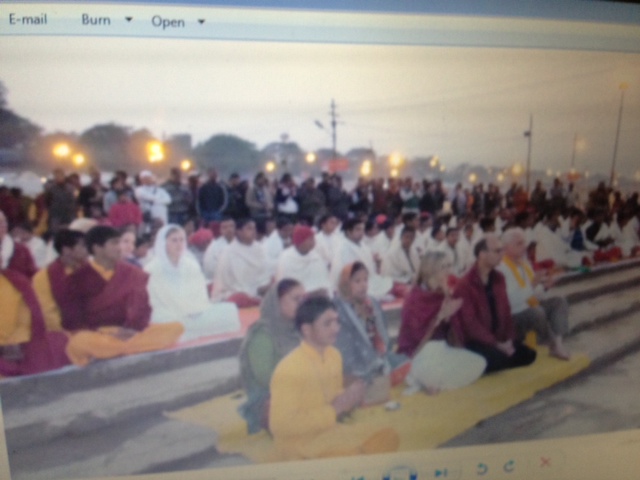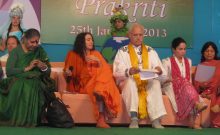January 14, 2013
First Auspicious Bathing Day
The Sangam
Kumbh Mela
Today after a simple breakfast of Masala Tea and a hot porridge, I joined in a Sacred Fire Ceremony with Swamijii in preparation to bathe in the Sangam for Makar Sankriti. Following that, a group of us made up of a few spiritual leaders and some of the ashram’s guests, began the journey through the huge crowds of people and down to the river flanked by an escort of yellow robed novices. There were about thirty or forty such devotees and they formed a human chain and wedge around us offering a buffer between us and the crowds and at the same time providing a practical way to move through such a tightly packed mass. The process reminded me much of splitting firewood with a wedge. Without them, one could press literally against the impenetrable wall of people without success or any forward movement.
As we neared the rivers shore, boats awaited us to take us out into the middle of the Sangam where the coming together of the three sacred rivers creates an ever shifting island of sand. This small island, several hundred yards in length and a hundred or so feet wide, perched exactly center amid the wide and deep flow of the great rivers, serves as an altar at the very vortex of one of the holiest points on earth … And it is our destination.
Getting to the center during the Kumbh and particularly on the first auspicious bathing day of Makar Sankriti is not easy. There are only a small number of boats, and the military monitors the traffic in and out to the sacred island, allowing only small groups of pilgrims at a time to have access. Also for many of India’s citizens, the cost of purchasing a fare is to high to allow them access.
On the shores of the river are literally nations worth of people making their way to the rivers edge to get as close as they can to the Sangam and the sacred center, but out of sheer practicality only a few million can come close at any time. The rest enter the river where they are, which can be as far away as ten miles. I feel so privileged to be where I am and to have such incredible access at this historic event.
As we board the boats, I am directed to join Swamijii on his boat. There is a moment of unsure footing as I step up onto the bobbing wet bow of the long low boat. First there is the act of removing my shoes, which is quite difficult as the boat sways to and fro from the lapping waves. This is a sacred vessel carrying irreplaceable cargo, and the dirt of everyday life is left on the shore, hence the shedding of the shoes. Then there is the act of bending down to get under the low canopy while not being able to steady oneself because of the fragility of the canopy’s structure.
As I board, Swamiji comments how important balance is in life, and his words have concrete meaning.
As the other eight passengers board our vessel, I note that it requires cooperation and give and take to keep the boat level. Without this, we would capsize. The metaphor is not lost on me, and I make a mental note to include it in my discussions and speeches going forward. Here we are, a group of highly connected spiritual wisdom keepers, yet with all of our wisdom it is still the act of complying with the laws of nature that provides us a balanced and secure vessel from which to share our journey.
I am reminded that a part of my work in the world is to weave the different religions and cultures of the world into a giant fabric that is not only strong and beautiful, but also one that is so tightly woven that it will easily float on the surface of the daily waves and valleys that face us all. And that like all fabric that floats, it must flexible. And to be flexible, each thread must be free to twist and bend and rise and fall within its own time and space, because no thread is ever in the same place during the journey. And so I see diversity as sacred, and critical to the survival of all. There isn’t an us and them, there is only us and the divine. That event created our diversity, not us. Our job is to find out what pattern reveals divinities’ plan, and how our thread can play a part in reflecting the beauty of that divine will. Until we see each other as all being passengers on the same boat, and all recognize where we need to stand to bring balance to whole of humanity, we shall remain always in the position of boarding the boat with a rocking surface beneath our feet, and only a fragile fabric to steady our course.
Our boat now carefully balanced, we make our way out onto the water, flanked on both sides by our yellow robed companions. They soon break out in harmonic chant, and shortly others on the river on other boats join in. The sound of their wonderful voices combined with the rhythmic splash of the rowman’s oars lends a mystical quality to the journey out o to the Sangam.
As we approach the tiny atoll surrounded by many boats, our singing procession magically opens a channel through to clear water and a place to beach. We reverse the process from our point of departure, and gently disembark on the sacred shore. As I look around, I see that there is much pollution and trash on the banks of this tiny altar, a fact that we discussed before leaving. Inspired, and wanting to teach by example, Swamiji, myself and others, decide to pick up some of the trash, and then a miracle happened.
Typically, revered spiritual leaders would never do menial labor here. Such a thing is virtually unheard of. Most are cared for like treasured figures, coddled and served by those in their followings. To see two highly respected holy men dressed in their traditional spiritual attire, raking cans and bottles and plastic out of piles of muck dripping with filth that would turn even the strong persons stomach sour, was a scene beyond their imagination. Pilgrims pointed and leaned out over their boats to get a better look. Many took out cameras and shot photos to take home.
And then an idea came to me that I knew in my heart was the thing to do.
I began to seek out the worst of the piles close to the pilgrims, and intentionally mucked in front of them. Then after sorting out the trash from the mire, I would rinse my hands in the water next to the trash and then bless myself on the forehead. Then I would point to the trash pile and beacon them to join me. At first they were hesitant, but after a bit one or two jumped off the boat and joined in. Soon the whole shore was cleaned of trash, and I knew we had hit a nerve. Sometimes one is in exactly the right time and the right place to plant a seed that will grow beyond imagination, and this was one of those times.
Press came and onlookers on the shore gawked to catch a glimpse of what we were doing. I was interviewed and spoke my mind about the sacredness of our Mother Earth.
As a spiritual leader from a tradition based on the sacredness of nature and of a belief in the ability to shift the outcome of the future through action and will, it just seemed to me to be the time to walk my talk.
How can I expect others to step forward and get dirty unless I am willing to dive in first?
After cleaning up the shore, our group waded out into the water of the swirling river, and Swamiji and I asked blessings for all. Then I closed my eyes, held my breath, and plunged deep into the frigid waters, feeling a sense of peace I hadn’t found in years. As I broke the surface, I felt sure that our actions would shift a whole culture, and perhaps initiate similar responses from people in other sacred places worldwide. We all have a responsibility to our planet and our fellow inhabitants, so lets start doing something more than just talk. And to those who don’t think that there is any value to a Pagan traveling to Kumbh Mela, think again.
The Hindus have welcomed me with open arms, and even invited me to participate in a place of honor in their most sacred rituals. I have been acknowledged as a keeper of wisdom, not just for my own community, but for everyone.
Let us not forget that in order to find ways to peace in the world, we must first get to know our neighbors. And then after getting to know them, find our commonalities so that we have something to build on.
The Swami has now arraigned with officials to have twenty five thousand trash bags delivered to the Kumbh for the first time, for pilgrims to use during the remainder of the event to lay the foundation for a totally green Kumbh Mela by 2024. The news papers and TV stations have gone viral with the idea, and so it begins.
I am tired now as much has happened, and I still have far to go before I leave. Then when I return home, I join with my own spiritual community for one of our own sacred events in San Jose California. We have many in our community who work to contribute to a better world, and I hope to share what I have learned here today with each and every one of them. It’s not easy being on the front lines of change, but change is critical if we want there to be a better world in the future.
So as the Hindus say:
Namaste! Let us all connect, heart to heart.
And may the blessings of this day benefit our planet and all of its inhabitants, for centuries to come.
Patrick McCollum



Leave a Comment